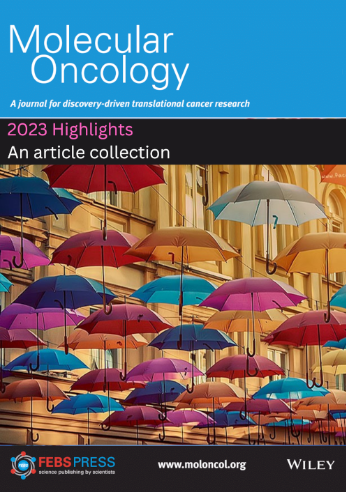PGAM1通过cAMP/AMPK/CEBPB途径调控ASS1参与乳腺癌的进展
IF 5
2区 医学
Q1 ONCOLOGY
引用次数: 2
摘要
磷酸甘油酸突变酶1 (Phosphoglycerate mutase 1, PGAM1)是一种重要的糖酵解酶,其表达状态已被证实与肿瘤的进展和转移有关。然而,PGAM1的确切作用和其他生物学功能尚不清楚。在这里,我们报道PGAM1表达上调并与乳腺癌(BC)患者的不良预后相关。功能实验表明,PGAM1基因敲低可抑制BC细胞的增殖、侵袭、迁移和上皮间质转化。通过RNA测序,我们发现PGAM1敲低后,BC细胞中精氨酸琥珀酸合成酶1 (argininosuccinate synthase 1, ASS1)的表达显著上调,这是抑制BC细胞恶性生物学行为所必需的。重要的是,我们证明了PGAM1通过cAMP/AMPK/CEBPB轴负调控ASS1的表达。体内实验进一步证实PGAM1通过改变ASS1表达促进BC肿瘤生长。最后,免疫组织化学分析显示,在BC患者中,ASS1水平下调与PGAM1表达和不良预后相关。我们的研究为PGAM1介导的BC进展的调控机制提供了新的见解,可能为BC治疗的潜在靶点和联合治疗策略提供了新的思路。本文章由计算机程序翻译,如有差异,请以英文原文为准。
PGAM1 regulation of ASS1 contributes to the progression of breast cancer through the cAMP/AMPK/CEBPB pathway
Phosphoglycerate mutase 1 (PGAM1) is a crucial glycolytic enzyme, and its expression status has been confirmed to be associated with tumor progression and metastasis. However, the precise role and other biological functions of PGAM1 remain unclear. Here, we report that PGAM1 expression is upregulated and related to poor prognosis in patients with breast cancer (BC). Functional experiments showed that knockdown of PGAM1 could suppress the proliferation, invasion, migration, and epithelial–mesenchymal transition of BC cells. Through RNA sequencing, we found that argininosuccinate synthase 1 (ASS1) expression was markedly upregulated in BC cells following PGAM1 knockdown, and it is required to suppress the malignant biological behavior of BC cells. Importantly, we demonstrated that PGAM1 negatively regulates ASS1 expression through the cAMP/AMPK/CEBPB axis. In vivo experiments further validated that PGAM1 promoted tumor growth in BC by altering ASS1 expression. Finally, immunohistochemical analysis showed that downregulated ASS1 levels were associated with PGAM1 expression and poor prognosis in patients with BC. Our study provides new insight into the regulatory mechanism of PGAM1‐mediated BC progression that might shed new light on potential targets and combination therapeutic strategies for BC treatment.
求助全文
通过发布文献求助,成功后即可免费获取论文全文。
去求助
来源期刊

Molecular Oncology
医学-肿瘤学
CiteScore
12.60
自引率
1.50%
发文量
203
审稿时长
6-12 weeks
期刊介绍:
Molecular Oncology highlights new discoveries, approaches, and technical developments, in basic, clinical and discovery-driven translational cancer research. It publishes research articles, reviews (by invitation only), and timely science policy articles.
The journal is now fully Open Access with all articles published over the past 10 years freely available.
 求助内容:
求助内容: 应助结果提醒方式:
应助结果提醒方式:


